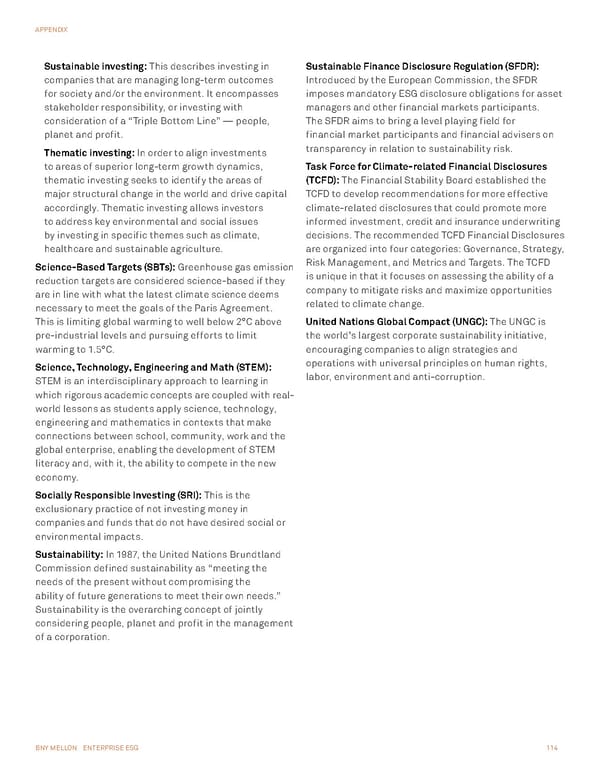BNY MELLON ENTERPRISE ESG 114 APPENDIX Sustainable investing: This describes investing in companies that are managing long-term outcomes for society and/or the environment. It encompasses stakeholder responsibility, or investing with consideration of a “Triple Bottom Line” — people, planet and profit. Thematic investing: In order to align investments to areas of superior long-term growth dynamics, thematic investing seeks to identify the areas of major structural change in the world and drive capital accordingly. Thematic investing allows investors to address key environmental and social issues by investing in specific themes such as climate, healthcare and sustainable agriculture. Science-Based Targets (SBTs): Greenhouse gas emission reduction targets are considered science-based if they are in line with what the latest climate science deems necessary to meet the goals of the Paris Agreement. T his is limiting global warming to well below 2°C above pre-industrial levels and pursuing efforts to limit warming to 1.5°C. Science, Technology, Engineering and Math (STEM): S TEM is an interdisciplinary approach to learning in which rigorous academic concepts are coupled with real- world lessons as students apply science, technology, engineering and mathematics in contexts that make connections between school, community, work and the global enterprise, enabling the development of STEM literacy and, with it, the ability to compete in the new economy. Socially Responsible Investing (SRI): This is the exclusionary practice of not investing money in companies and funds that do not have desired social or environmental impacts. Sustainability: In 1987, the United Nations Brundtland Commission defined sustainability as “meeting the needs of the present without compromising the ability of future generations to meet their own needs.” Sustainability is the overarching concept of jointly considering people, planet and profit in the management of a corporation. Sustainable Finance Disclosure Regulation (SFDR): I ntroduced by the European Commission, the SFDR imposes mandatory ESG disclosure obligations for asset managers and other financial markets participants. The SFDR aims to bring a level playing field for financial market participants and financial advisers on transparency in relation to sustainability risk. Task Force for Climate-related Financial Disclosures (TCFD): The Financial Stability Board established the TCFD to develop recommendations for more effective climate-related disclosures that could promote more informed investment, credit and insurance underwriting decisions. The recommended TCFD Financial Disclosures are organized into four categories: Governance, Strategy, Risk Management, and Metrics and Targets. The TCFD is unique in that it focuses on assessing the ability of a company to mitigate risks and maximize opportunities related to climate change. United Nations Global Compact (UNGC): The UNGC is the world’s largest corporate sustainability initiative, encouraging companies to align strategies and operations with universal principles on human rights, labor, environment and anti-corruption.
 BNY Mellon ESG Report Page 113 Page 115
BNY Mellon ESG Report Page 113 Page 115